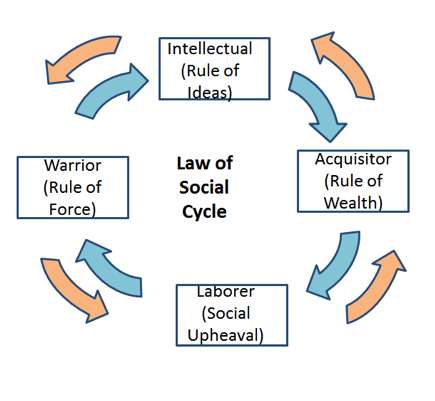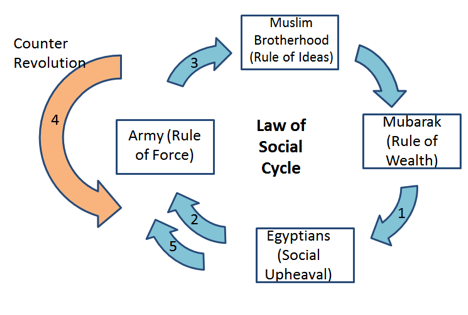By Apek Mulay
Introduction
The Arab Spring is widely believed to have been instigated by dissatisfaction with the rule of local governments, though some have speculated that wide gaps in income levels may have had a hand as well. Numerous factors led to the protests, including issues such as dictatorship or absolute monarchy, human rights violations, political corruption, economic decline, unemployment, extreme poverty and a number of demographic structural factors, such as a large percentage of educated, but dissatisfied youth within the population [1]. By December 2013, rulers had been forced from power in Tunisia, Egypt , Libya and Yemen; civil uprisings had erupted in Bahrain and Syria; major protests also broke out in Algeria, Iraq, Jordan, Kuwait, Morocco and Sudan; while minor protests occurred in Mauritania, Oman, Saudi Arabia, Djibouti, Western Sahara and the Palestinian Authority [1].
Law of Social Cycle
The theory was propounded by the Indian philosopher and spiritual leader Prabhat Ranjan Sarkar in the 1950s and expanded by Ravi Batra since the 1970s, Johan Galtung and Sohail Inayatullah since the 1990s and others [2]. According to this theory, people in any society are all relatively similar; they have generally the same goals, desires and ambitions – but differ in the way they go about achieving their goals. Based on their approach to achieve those goals people could be classified into four different psychological categories viz. warriors, intellectuals, acquisitors and labourers [2].
Warriors [2]
Warriors are people with strong bodies, vigorous physical energy and a sharp intellect. Warriors tend to develop the skills that take advantage of their inherent gifts of stamina, courage and vigor. Their mentality is one that is not averse to taking physical risks. They all achieve success through their physical skills and a deep understanding of their profession. Examples of people in our society with the warrior mentality include: policemen, firemen, soldiers, professional athletes, etc.
Intellectuals [2]
Intellectuals have a more developed intellect than the warriors, but generally lack the physical strength and vigor. Intellectuals are happiest when they try to achieve success by developing and expressing their intellectual skills and talents. Examples would be: Teachers, writers, professors, scientists, artists, musicians, philosophers, doctors and lawyers and above all, priests.
Acquisitors [2]
Acquisitors have a penchant for acquiring money. If money can be made, the acquisitors will find a way to make it. They are not considered as bright as the intellectuals, nor as strong as the warriors, but they are keen when it comes to making and accumulating money and material possessions. Such people are the traders, businessmen, managers, entrepreneurs, bankers, brokers and landlords in our society.
Laborers [3]
Laborers lack the energy and vigor of the warriors, the keen intellect of the intellectuals, or the ambition and drive of the accumulators. Their contribution to society is profound and no society could function without them. However, the other groups generally look down upon and tend to exploit them. The laborers- including peasants, serfs, clerks, short order cooks, waiters, janitors, doormen, cabdrivers, garbage collectors, truck drivers, night watchmen and factory workers – keep society running smoothly by working diligently and without complaint.
Figure 1: Law of Social Cycle explained in pictorial form. As shown in figure above, control of Society keeps moving from Intellectuals to Acquisitors to Laborers to Warriors in a clockwise or anti-clockwise direction depending on the domination of Intellectuals, Acquisitors, Warriors or Laborers.
The Social Cycle Theory has its source in the concepts of Macrohistory presented in P.R. Sarkar’s philosophical treatise Ananda Sutram along with original concepts of metaphysics, epistemology, ethics and macrohistory [3]. According to Sarkar, in this movement of the social cycle, one class is always dominant. The movement of the Social Cycle in a clockwise direction in Fig 1 (shown by Blue arrows) constitutes an “Evolution” if it occurs after a sufficiently long duration. If this clockwise movement occurs within a short duration, this is called “Revolution.” The movement of the Social Cycle counter-clockwise in Fig 1 (shown by Orange arrows) constitutes a “Counter Evolution” if it occurs after a significantly long duration. This counter-evolution is extremely short-lived. But, if this anti-clockwise movement occurs within a short duration, it is called “Counter Revolution.” Counter-revolution is even more short-lived than counter-evolution. The successful operation of the “Law of Social Cycle” has been analyzed by Professor Ravi Batra from SMU, Dallas in his 1978 book The Downfall of Capitalism and Communism: A New Study of History[4].
Law of Social Cycle in Egypt
After the Second World War, the US was the only developed country which had not experienced that war fought on its soil. As the US became a global nexus of capitalism, US-based multi-national corporations (MNCs) influenced “Free Trade” agreements between member nations in order gain free access to the markets and increase their consumer base [5]. The capitalists or acquisitors from the US were also very eager to reap profits from the oil rich countries in Middle East. While the US theoretically advocated Democracy all over the world, when it came to the Middle East, US policy has been different. The 1979 Iranian revolution resulted in the overthrow of the Shah of Iran by a Mass revolution [6]. As a result of this, the US tightened its grip over the oil rich countries in Middle East by supporting dictators in several Middle Eastern countries. Hosni Mubarak became the President of Egypt following the assassination of then-president Anwar Sadat on 6 October 1981 [7]. By means of supporting dictators like Mubarak in Egypt, US was able to exercise its control over the Suez Canal which was a strategic port connecting the Middle East to the rest of world by Sea.
During Mubarak’s reign as dictator in Egypt starting in 1981, he suppressed the fundamentalists in Egypt with an Iron hand. He made it officially illegal for Islamic groups like the Muslim Brotherhood to distribute literature or assemble in public [8]. Although Mubarak acted in best interest of his western allies, the economic conditions of ordinary Egyptians did not improve during his reign leading to large scale unemployment because Mubarak looked after his own interests over the interests of his subjects. There was also suppression of their political freedom in Egypt. This 30 years rule of Hosni Mubarak was indeed because of Rule of Acquisitors who supported dictatorial regime in Egypt to get access to strategic Suez Canal.
After the great recession struck in US in 2007, the lingering weakness of American economy which was so far ignored by experts and government came to the surface. During this recession, US were forced to cut foreign aid to several of its allies in order to have sufficient funds to stimulate its domestic economy. The huge unemployment and exposed political corruption ignited the spark of mass protests which is now called as the Arab Spring. The spark grew like a raging wildfire with mass demonstrations engulfing several countries in Middle East including Egypt. Eventually, After 18 days of protests and demonstrations by masses on Egypt’s Tahrir Square, Mubarak had to step down as a dictator due to International pressure. These Mass Demonstrations were the Social Upheaval or rule of Laborers in Egypt. In order to restore civil order in Egypt, the Egyptian army took control of country post Mubarak. This rule of Army was essentially Rule of force by the warrior class in Egypt. After the Egyptian military took control of Egypt, the citizens of Egypt demanded free and fair democratic elections.
Democracy is defined as government of the people, for the people and by the people. But, in fact, it is the rule of the majority. Hence democracy means mobocracy when the government under a democratic guise is guided by mob psychology. The majority of people can often be manipulated. The wise are always in a minority. Thus finally democracy can amount to nothing but a “foolocracy”. In such a system, the government of the people, by the people and for the people would mean government of fools, by fools and for fools [11]. Due to inherent defects in democratic process and because of rule of majority in Democratic elections, the long suppressed Muslim brotherhood rose to power with their presidential candidate, Mohamed Morsi, winning 52% of votes [12].
The election of Mohamed Morsi enabled the Muslim brotherhood to make changes in the existing constitution in order to impose aspects of Islamic law. These constitutional changes were counter evolutionary because instead of evolution of Egyptian society with progressive ideas, Muslim brotherhood made an attempt to take the society back to regressive ideas which existed in 7th Century Arabia. The liberal minded Muslims and Egyptians from other religious faiths were opposed to imposition of these Islamic ideas which led to a Mass Demonstrations once again on Tahrir square demanding resignation of the newly elected president. This short period of presidential rule of Mohamed Morsi could be considered as the Rule of Ideas or rule of Intellectual class. This proves that only progressive ideas lead to evolution of society and those ideas which are regressive or go against the evolution and progress of society are extremely short lived. The Mass Demonstrations turned back the clock of Social Cycle in Egypt and Rule of Ideas was replaced by Social Upheaval thereby bypassing the Rule of Force by Warriors. This movement of Social Cycle from the Rule of Intellectuals to Rule of Laborers could be considered as ‘Counter Revolution‘ due to application of tremendous revolutionary force bypassing the counter-evolution where control was supposed to mover in hands of the Egyptian army thereby establishing a Rule of Force.
As mentioned by P R Sarkar in Ananda Sutram, A ‘Counter Revolution‘ is even shorter lived than ‘Counter Evolution‘ [3]. This proved to be true as Egyptian Army quickly took control back in their hands and election of Mohamed Morsi was cancelled and he was placed under house arrest. The rule of Warriors was a process of natural evolution after social upheaval and hence it has continued for a while in Egypt. This Social change since Arab Spring in Egypt has been graphically been explained in Figure 2.
Figure 2: Recent Social events in Egypt complying with P.R. Sarkar’s Law of Social Cycle showing different stages of Evolutions and Counter Revolution.
What lies ahead for Egypt?
As the Rule of Warriors post recent Social upheaval has been a process of evolution, it is expected to last for a while. The Egyptian army has a very important role to restore a functioning democracy in Egypt based on progressive ideas. Based on the above analysis, I have proved that Law of Social Cycle worked successfully in recent history of Egypt. The understanding of this ‘Law of Social Cycle’ is also best way of forecasting Macro-history in Egypt and around the world. To end the martial law in Egypt and to have a stable civil society, it is duty of military to seek help and work with International community in bringing the much needed reforms in its democracy to respect the interests of minority even when there is a rule of majority in democracy.
In his book The Modernization of Islam, author and historian Dr. Susmit Kumar analyzed the Social, Political and religion in Middle East and concluded that the rise of fundamentalism is inevitable not just in Egypt but all Islamic countries in Middle East and North Africa [13]. The Muslim brotherhood tried to take control of a country with secular past like Egypt and made an unsuccessful attempt by democratic means to establish Islamic law. As part of natural evolution, the Social Cycle in Egypt should move from Rule of Warriors to Rule of Ideas. If the Egyptian Military gets assistance from democracies in west and establishes a secular democracy in Egypt, then the future is bright not just for all Egyptians but in general for entire Middle East. However, If Western democracies fail to solve problems in their own economy and also fail to bring about progressive reforms in their existing democracies, it is very likely that Egypt would fall into the hands of radical Islamists.
Therefore, if the West wishes to lead countries like Egypt towards social and economic progress, it is very critical for them to get their own domestic economies in order. It is in best interest of West to have a stable and progressive democracy established in Egypt in order to pursue International trade via Suez Canal. If however, Out of their self-interest, the West forgets and leaves Egypt with its own troubles (just like it abandoned Afghanistan post Collapse of Soviet Communism) instead of assisting the Egyptians, the rise of fundamentalism in not just Egypt but entire Middle East seems inevitable. Since Rule of Warriors is followed by the Rule of Ideas in process of evolution as put for by P R Sarkar, Depending on the assistance received from its western allies, Egypt would have a governance with either progressive and democratic ideas or regressive and undemocratic ideas like Sharia law.
References
[1] Arab Spring, Wikipedia -the Free Encyclopedia. http://en.wikipedia.org/wiki/Arab_Spring
[2] Law of Social Cycle, Wikipedia- the Free Encyclopedia. http://en.wikipedia.org/wiki/Law_of_Social_Cycle
[3] P R Sarkar, Ananda Marga Philosophy in a Nutshell, Ananda Sutram, Chapter 5, AMPS (1959).
[4] Ravi Batra, ‘The Downfall of Capitalism and Communism’, Venus Publications (May 1978).
[5] Apek Mulay, ‘Should USD be restored to Gold Standard?’ PROUT Globe (4 August 2013). http://www.proutglobe.org/2013/08/should-usd-be-restored-back-to-gold-standard/
[6] Iranian Revolution, Wikipedia -the Free Encyclopedia. http://en.wikipedia.org/wiki/Iranian_Revolution
[7] History of Egypt under Hosni Mubarak, Wikipedia -the Free Encyclopedia. http://en.wikipedia.org/wiki/History_of_Egypt_under_Hosni_Mubarak
[8] History of the Muslim Brotherhood in Egypt (1954–present), Wikipedia -the Free Encyclopedia. http://en.wikipedia.org/wiki/History_of_the_Muslim_Brotherhood_in_Egypt_(1954%E2%80%93present)
[9]Larry Everest, HOSNI MUBARAK: A Profile of an American-Backed Tyrant (7 Feb 2011) http://www.revcom.us/a/224online/mubarak-en.html
[10] John R. Bolton, The Wall Street Journal, Cutting off aid to Egypt would be a mistake (11 Jul 2013)
[11]Apek Mulay, Truth-out.org, Reforms for Converting the Present Corporate Democracy into Meaningful Civilian Democracy (16 Sept 2013)
[12] Adnan Khan, Khalifah.com, Egypt, Morsi and the Muslim Brotherhood: Challenges and Threats (12 July 2012) http://www.khilafah.com/index.php/analysis/middle-east/14224-egypt-morsi-and-the-muslim-brotherhood-challenges-and-threats
[13] Susmit Kumar, PROUT Globe, The Modernization of Islam http://www.proutglobe.org/2011/10/modernization-of-islam/



